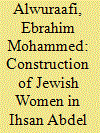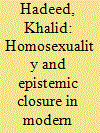|
|
|
Sort Order |
|
|
|
Items / Page
|
|
|
|
|
|
|
| Srl | Item |
| 1 |
ID:
186310


|
|
|
|
|
| Summary/Abstract |
The article examines Ihsan Abdel Quddous’s literary texts that deal with Egyptian Jewish women to explore how Egyptian Jewesses figure in these texts to disrupt, disturb, or offset prevailing historical and fictional discourses and explore his attitude toward Egyptian Jews in general and Jewish women in particular. Deploying post-colonial feminist theory, the article argues that in Quddous’ works, Jewish women represent a highly-educated and liberal community with fluid, transnational identities that serve to foil exclusionary discourses, and that Quddous increasingly has given Egyptian Jewish women, more than any other Arab writer of the period, a voice and an active role in his works. As a result, he has articulated their hopes, fears, and needs in a period dominated by political and social instability. The article aims at identifying and categorizing major tropes and characteristics pertaining to the portrayal of Jewish women in Ihsan Abdel Quddous’ fiction, and how these portrayals adhere to or play on the universal stereotypes of Jews.
|
|
|
|
|
|
|
|
|
|
|
|
|
|
|
|
| 2 |
ID:
165376


|
|
|
|
|
| Summary/Abstract |
This article offers an analysis of the prominent Egyptian novelist Sonallah Ibrahim’s literary critique of neoliberal Egypt in a selection of his novels: al-Lajna (The Committee, 1981), Dhāt (Self, 1992), and Sharaf (Honor, 1997). It argues that Sonallah Ibrahim makes strategic use of space in his novels as heterotopias of the neoliberal Egyptian state. Heterotopia, here, refers in the Foucauldian sense to a site of deviation, exclusion, and non-normativity that is capable of reflecting the totality of normative order. In Ibrahim’s novels, the heterotopias of the neoliberal state are both narrative and formal. They are spaces in which narrative action takes place as well as specific formal sites in the representational space of the text conveying non-narrative discourse. As such, this article explores the interplay between narrative and representational space in the construction of Sonallah Ibrahim’s critique of the neoliberal Egyptian state.
|
|
|
|
|
|
|
|
|
|
|
|
|
|
|
|
| 3 |
ID:
125949


|
|
|
|
|
| Publication |
2013.
|
| Summary/Abstract |
In this paper I argue that representations of homosexuality in modern Arabic literature have tended to isolate it and contain its threat through a conceptual strai(gh)tjacket that I term "epistemic closure." I begin by analyzing Sa?d Allah Wannus's play Tuqus al-Isharat wa-l-Tahawwulat as an essentialist paradigm of closure, where a language of interiority and essence identifies male homosexuality with passivity and femininity, subordinated a priori to a sexually and socially dominant masculinity. Then, I examine ?Ala? al-Aswani's novel ?Imarat Ya?qubyan as a constructionist example of the same closure, in which homosexuality is explained through a narrative of abnormal development that circumscribes its diffuse potential. Finally, I read Huda Barakat's Sayyidi wa-Habibi as a "queer" novel that links homosexuality to the continuum of male homosocial desire, thereby disrupting the normative distribution of center and margin and suggesting a way out of the epistemic closure imposed on homosexuality.
|
|
|
|
|
|
|
|
|
|
|
|
|
|
|
|
|
|
|
|
|